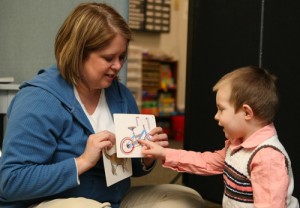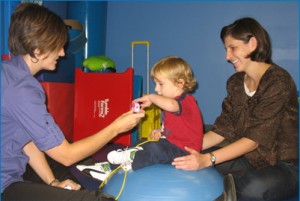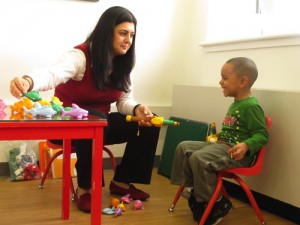What Happens During the Initial Assessment?
Before you bring your child to a speech therapist for an initial assessment, your child may have had a few preliminary screenings. If you notice that your child has had problems communicating, you might ask his pediatrician to conduct a screening. The pediatrician will conduct a few tests to determine if your child might have delayed speech development. If this is the case, he may refer you to an audiologist for a hearing test. This will determine whether your child’s communication issues arise from a hearing problem, rather than a speech disorder.
If your child passes the hearing test, your pediatrician may refer you to a speech-language pathologist (SLP), or speech therapist. The SLP may wish to conduct an additional quick screening before doing a full assessment. This brief screening typically involves the therapist observing your child, often while he interacts with classmates. The purpose of this screening is to determine whether the child may display possible signs of a speech disorder.
If your child appears to have communication difficulties during the SLP’s screening, the SLP will likely recommend an initial assessment, which is a full evaluation to determine the type and extent of the possible speech disorder. Having your child undergo an assessment does not automatically mean that he has a speech disorder; the SLP will determine this during the assessment. Sometimes, the initial assessment will be broken into several sessions. During the initial assessment, the speech therapist will conduct a series of tests and evaluations.
The speech therapist will begin by asking you about your child’s communication issues. Be specific – don’t hesitate to share your observations. The SLP may be a professional in his field, but you know your child best. If you have samples of your child’s schoolwork, bring them along. The speech therapist will also ask you about your child’s development and other medical issues, such as frequent ear infections. It’s also helpful for him to know whether there is a family history of speech disorders.
During the initial assessment, the speech therapist may use informal or formal tests, or he could use a combination of both. Formal tests are simply standardized tests. An SLP conducting an informal test will appear to simply be chatting or playing with the child. In actuality, he’s evaluating how the child articulates words, puts sentences together, and processes questions.
During informal tests, your child may be asked to point to certain pictures. For example, he may be asked to point to “the monkeys eating bananas.” This tests your child’s receptive language skills. If your child points to a picture of a sole monkey instead of a group of monkeys, he may have trouble comprehending language.
Your child’s speech therapist will also pay attention to his voice quality. The SLP will make a note of whether the voice sounds hoarse; he’ll also check for nasality, resonance, and the flow of speech. He will likely do a physical exam of the palate, tongue, and lips. He’ll assess how well your child moves his tongue and lips. Your child may be asked to make the “aahh” sound.
The speech therapist may also use formal tests. For example, the Monroe Sherman test, which takes about 30 minutes to complete. It covers word discrimination, reading comprehension, and speed of reading. The results of standardized tests are given in percentiles. This indicates what range your child is in: above average, average, or below average (as compared to your child’s peers taking the same test). Following the initial assessment, expect a written report from the speech therapist.





